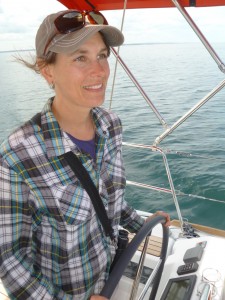 I’m on a sailboat, traveling north from Mystic, Connectictut, reading the Odyssey. I’m on the boat because a friend asked for help (and I love boats, miss boats, miss the essence of myself that enlivens upon them). I’m reading Homer because I’m mentoring a low-residency MFA student, and we’re exploring on “the long poem” (and I haven’t read Homer since I was an undergraduate, and I love boats).
I’m on a sailboat, traveling north from Mystic, Connectictut, reading the Odyssey. I’m on the boat because a friend asked for help (and I love boats, miss boats, miss the essence of myself that enlivens upon them). I’m reading Homer because I’m mentoring a low-residency MFA student, and we’re exploring on “the long poem” (and I haven’t read Homer since I was an undergraduate, and I love boats).
It’s day two of our sail. There are four of us aboard. It’s spring. Cool on the ocean, lilacs blooming on land. It’s morning. We’re having coffee before leaving Cuttyhunk Island. Common eiders moan in the harbor, a crèche of chicks following three females (they nest here? Holy shit. They nest here. This is not in the books.). Oystercatchers cry overhead, pairs scribing the early sky.
My friend asks me if I’ve read Alice Walker’s The Temple of My Familiar. It’s just the two of us on board. The others—her girlfriend, her girlfriend’s father—have taken a morning stroll. Yes, I’ve read it… but it’s been years. I can’t dredge up a single thing. In the book, she says, past lives speak.
The book she’s reading is about past lives and being in the present. She is a healer. She is a seeker. All lives, she says, are also with us in this very moment. I am woefully untuned to her world, but I’m reading. I’m reading of sailboats in the Mediterranean while I’m on a sailboat.
I turn a page. Odysseus is sharpening a stick to thrust into the eye of the Cyclops. It’s gory. The boat. The wine-dark sea. The Westwind Odysseus wants to take him home….
We’d welcome it. We’d welcome any breeze other than one on the nose, because it’d let us sail instead of use the engine as we head north to my home. I am heading home. To the tip of Cape Cod. Odysseus is trying to head home, too. He’s not making very fast progress.
My friend is laughing. I am laughing. She is reading a book about being in the present, and she can’t concentrate because… well, because it’s a beautiful morning. She’d rather be in the present than read about being in the present.
When she talks about being in the moment, about all those pasts converging, David Byrne’s lyrics come to mind. I sing to her:
Oh my brother, I still wonder, are you alright…
Everything that happens will happen today.
Nothing has changed but nothing’s the same
and every tomorrow will be yesterday,
and everything that happens will happen today.
Past lives. Tomorrow. Today. The ducks are breeding. The boat floats on the tide. We read. We rouse ourselves to the morning. We are distracted and awake. The world feels limpid and clear and of this moment.
Odysseus carried his lives with him. The past, the past, the past, his wrongs and hurts and the gods that he must cannily anticipate and placate. He’s with the goddess/monster on the island. He’s in Troy. He’s on the boat. Today is about yesterday. Determined by yesterday. It’s about stories and how they are told. It’s about layers of disguise.
Where do poems come from? The world insists itself. A common tern chirrs and dives for fish. The tide seems, in Cuttyhunk, to never rise or fall. We are alongside a dock and have set our mooring lines to allow the tide to lift and drop us. We can see the seaweed and barnacles on the pilings, but we seem to never rise or drop. Is Cuttyhunk one of the magical isles of the Aegean? Is there a goddess at work? A god? Dawn arrives on her gold throne. We put on sunscreen and hats.
A goddess arrives and addresses Odysseus. He lies to her. She likes it. On the beach, oystercatchers play their game of broken wing, luring walkers away from the nest. I like it. I like it more than the page.
Odysseus. Homer. Alice Walker. Then. Now. Now. Now.
The world is so fucking insistent. And that’s what I love about it. Rose-fingered dawn. There are poems about dawn. There are poems about boats in harbors. It is dawn. We are in a harbor. Soon, we will cast off. Odysseus will come with us, shut in his covers, riffled by wind. I might open him if I’m bored.
We will scout for rocks. We will watch the buoys set out to warn us against grounding—are they our gods, the things Odysseus would have poured wine to placate?—we will sail the tv glow-blue sea. We will not be lured by sirens. We will sing of a woman and of a voyage. We will make our short journey.
Words will travel with us from Homer, from Byrne, from Walker, from sage minds that help us find our way. We will invent words to detail what we see and what gives us wonder.
The currents will eddy around us. The currents of what we’ve know, what we’ve read, what we’ve learned.
Odysseus, the wily, the brave, the canny, is going home. I am going home. I am carrying a huge horse full of lies and trickery with me. I am carrying those ducks, those birds, the fact of the narrow entrance into Cuttyhunk. Alice Walker, temple-maker, you are with us, too. We are traveling together.
Everything that happens will happen today. Look up. Look up from the page. Everything that happens…

